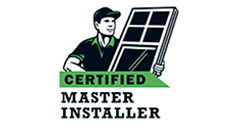So many experts, including Bob Vila, don’t recommend installing vinyl sliding doors because of vinyl’s structural limitations. Did you know that vinyl expands and contracts four to five times more than wood or even metal? Astonishing but true! This means that, eventually, the performance of the entire door is affected.
A vinyl sliding door becomes harder to operate when it’s hot outside. When the sun is hot, vinyl heats up and expands, making the door stick or rub because it’s just a bit larger. You may begin to notice some performance issues, especially in summer. It’s very common to get a slight 1/16th-inch crack around your door just from the vinyl frame expanding and contracting.
In winter the exact opposite happens—it gets cold, so the vinyl frame contracts. When the door contracts, it pulls away from the glass. Now air is slipping through those hairline gaps! And it gets cold and uncomfortable around your patio door.
The Department of Energy says that a 1/16th-inch crack around an average-sized window opening is equivalent to a hole the size of a brick missing from a home! That’s a substantial energy loss around your door, whether it’s summer or winter.
It’s a slow process, it can take a few years before it becomes noticeable or annoying. Sometimes you just put up with it until the glass starts to fog up or the door won’t lock properly. Let me explain how that happens. The weight of the door and the variable heat in summer, day and night, causes the vinyl frame to bow and warp.
Bowing and warping may be the first visible sign that something’s wrong with your door. All that expansion is putting pressure on the track and the gliding wheels at the bottom of the door. And those long rails can buckle and bow too. The actual door panel itself will begin to be affected.
If it bows enough, it can affect the latch that locks the door. Once your door’s latching ability is impacted, that affects your security. If someone’s going to break into a house, the patio doors are typically an easy target. The burglar doesn’t know the properties of vinyl doors, but it’s likely he does know how easy it is to lift an older vinyl door panel out of its track.
And the fogging? Well, the vinyl frame is usually sealed to the glass with silicone caulk, so when it begins to bow, it pops the silicone loose, and that can pop the glass loose. This can create a leak in the glass unit, so that the energy efficient gas fill in the glass leaks out and heat and moisture seep in.
The fogging between the glass panes continues over time and is not practical to repair. Depending on your tolerance of fogged glass and the cold air infiltration in the winter, you will eventually want to replace the door. This is the life cycle of a vinyl patio door.
So, handle operation, locking mechanism, the glass seal, the rails, the air infiltration, everything is soon falling apart. And all because of that vinyl frame. Homeowners are much better off with “engineered wood” frames because frames made of composite materials won’t expand and contract like vinyl. They are stronger and more reliable. Maintenance free and easy to take care of, they will also look good for many summers and winters to come.
If you’re in the market for a sliding door, you need to consider (1) the structural capability of the frame (2) the energy efficiency of the overall door, and (3) the ease of operation. You want a solid door that is going to stand the test of time and give you security and peace of mind.
Sure, all these quality factors are going to affect the price of a door, but now that you understand the life cycle of a door, you can base your priorities on what’s important to you long term. It’s like the old saying, “Cheap ain’t good and good ain’t cheap.” And in the end, vinyl is neither good nor cheap!


















